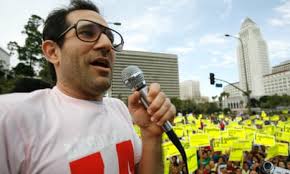The Impact of Dov Charney on Fashion and His Recent Ventures

Introduction
Dov Charney, the founder of American Apparel, has long been a controversial figure in the fashion industry. His innovations in clothing manufacturing and promotion of sweatshop-free, made-in-the-USA apparel garnered significant attention, shaping consumer consciousness towards ethical fashion. Moreover, his dramatic fall from grace and subsequent return to the business spotlight highlight the constantly evolving landscape of the fashion sector.
Charney’s Career Highlights
American Apparel, established in 1989, became synonymous with a bold marketing approach that celebrated both individuality and sexual expression. Charney was pivotal in employing a provocative advertising strategy that often sparked debates around sexuality and feminism. However, his tenure was marked by allegations of misconduct and management controversies, leading to his ousting in 2014. Despite this, American Apparel garnered a loyal following and significantly influenced contemporary fashion trends.
The Comeback
After a tumultuous period post-American Apparel, Dov Charney has recently made headlines again with his new company, Los Angeles Apparel. Launched in 2016, Los Angeles Apparel aims to revive the principles of ethical labor practices he once showcased at American Apparel. The brand focuses on producing high-quality, basic garments that are made locally in the USA, catering to consumers who value ethical manufacturing.
Since its inception, Los Angeles Apparel has experienced rapid growth, even amidst the challenges posed by the COVID-19 pandemic. Charney’s commitment to transparency and ethical practices in manufacturing has resonated with a segment of the market increasingly focused on sustainability and ethical consumption.
Current Market Trends
The fashion industry is undergoing a significant transformation with rising awareness about the environmental impact of fast fashion. Dov Charney’s continued influence in promoting ethical production is increasingly relevant as brands and consumers alike navigate the need for sustainability. As awareness of social responsibility grows, companies that invest in ethical practices may find themselves at an advantage.
Conclusion
Dov Charney remains a polarising yet influential figure within the fashion industry. His journey from the heights of American Apparel to his revival through Los Angeles Apparel reflects both personal resilience and a broader shift in consumer preferences towards sustainable fashion. As the market continues to evolve, Charney’s focus on ethical practices may provide valuable insights for emerging fashion entrepreneurs and consumers looking for responsible options in clothing.









